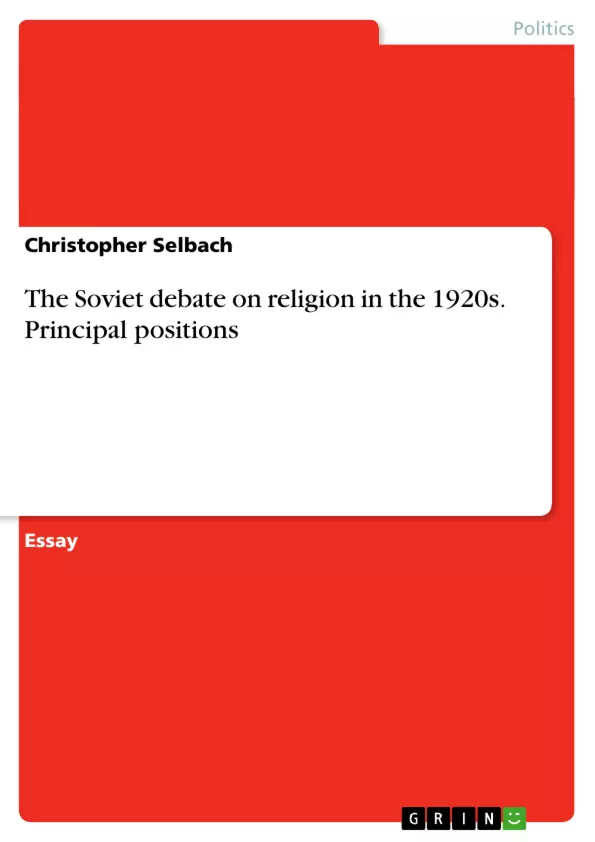The Soviet debate of the 1920s surrounding religion was mainly based on the Marxist dogma with its materialist notion of religion, but it nevertheless involved a great diversity of ideas. The discussion shows a tendency to increasingly acknowledge the complexity of religion, thereby stressing the need for harsher measures. Under Stalin's totalitarianism, however, the controversial philosophical dicussion was bound to come to an end: it was replaced by another straightforward attempt to eliminate religion physically. The essay takes a close look at the evolution of a debate that shaped the religious policies of the Soviet Union.
Inhaltsverzeichnis (Table of Contents)
- Outline the principal positions in the debate of the 1920s surrounding religion, its nature and its intended elimination by the Bolsheviks.
- Feuerbach's and Marx's critique of religion.
- The Bolsheviks' understanding of religion.
- Lunačarskij's position.
- The mechanicists' opinion.
- Trockij's notion of religion.
- Lenin's pragmatic approach.
- The dialectical materialists.
- Jaroslavskij and the "League of the Militant Godless".
- Conclusion.
Zielsetzung und Themenschwerpunkte (Objectives and Key Themes)
This essay aims to outline the principal positions in the debate of the 1920s surrounding religion in Soviet Russia, focusing on the Bolsheviks' efforts to eliminate it. The essay analyzes the philosophical underpinnings of the debate, rooted in Feuerbach and Marx's critique of religion, and explores various perspectives within the Bolshevik movement on the nature and potential elimination of religious belief.
- The nature of religion as a social and cultural phenomenon.
- The role of religion in the context of Marxist-Leninist ideology.
- The various strategies employed by the Bolsheviks to combat religion, including scientific education, propaganda, and physical suppression.
- The impact of different theoretical positions on antireligious policies during the 1920s.
- The evolving understanding of religion within the Bolshevik movement, from initial optimism about its imminent disappearance to a growing acknowledgement of its complexity and resilience.
Zusammenfassung der Kapitel (Chapter Summaries)
- The essay begins by examining the philosophical roots of the antireligious debate, drawing upon Feuerbach's and Marx's critiques of religion. It establishes the fundamental incompatibility between religion and Marxist-Leninist ideology.
- The essay then delves into the various perspectives on religion held by prominent Bolsheviks, highlighting the differing approaches towards its elimination. Lunačarskij advocated for a more gradual and less forceful approach, suggesting that religion could be manipulated to promote humanistic values. The mechanicists, on the other hand, believed that religion would naturally decline as science and education advanced.
- The essay explores Trockij's notion of religion as a form of entertainment for the working classes, and argues that new forms of entertainment would eventually supplant religious rituals.
- The essay then examines Lenin's more pragmatic approach, emphasizing the need for direct confrontation with religion, especially in the face of its persistence. Lenin advocated for a combination of scientific propaganda and direct antireligious measures.
- The essay concludes by analyzing the emergence of a more complex understanding of religion in the late 1920s, acknowledging its adaptability and resilience. This shift in perspective led to a renewed focus on combating religious movements, including renovationist groups.
Schlüsselwörter (Keywords)
The primary focus of this essay lies on the debates surrounding religion and its relationship to Marxist-Leninist ideology in Soviet Russia during the 1920s. Key terms and concepts include: religion, communism, Bolshevism, antireligious policies, Feuerbach, Marx, Lunačarskij, mechanicists, Trockij, Lenin, dialectical materialism, renovationism, "League of the Militant Godless," "bogostroitel'stvo." The essay explores the various theoretical positions within the Bolshevik movement regarding the nature of religion, its role in society, and the most effective strategies for its elimination. The essay emphasizes the evolution of understanding about religion in the Soviet context, from an initial optimistic view of its imminent decline to a later acknowledgment of its complexity and resilience.
Frequently Asked Questions
What was the Soviet stance on religion in the 1920s?
The debate was rooted in Marxist dogma, viewing religion as a social phenomenon that needed to be eliminated through education, propaganda, and eventually physical suppression.
How did Lenin's approach to religion differ from others?
Lenin took a pragmatic and direct approach, combining scientific propaganda with forceful antireligious measures to confront the persistence of faith.
What was Trotsky's view on religious rituals?
Trotsky saw religion as a form of entertainment for the masses and believed that new, socialist forms of culture and entertainment would eventually replace it.
What was the "League of the Militant Godless"?
Led by Jaroslavskij, it was a central organization dedicated to spreading atheism and actively combating religious influence in the Soviet Union.
Why did the philosophical debate on religion end under Stalin?
Under Stalin's totalitarianism, diverse intellectual discussions were replaced by a straightforward and often violent attempt to physically eliminate religion.
- Citation du texte
- Christopher Selbach (Auteur), 2001, The Soviet debate on religion in the 1920s. Principal positions, Munich, GRIN Verlag, https://www.grin.com/document/16467



